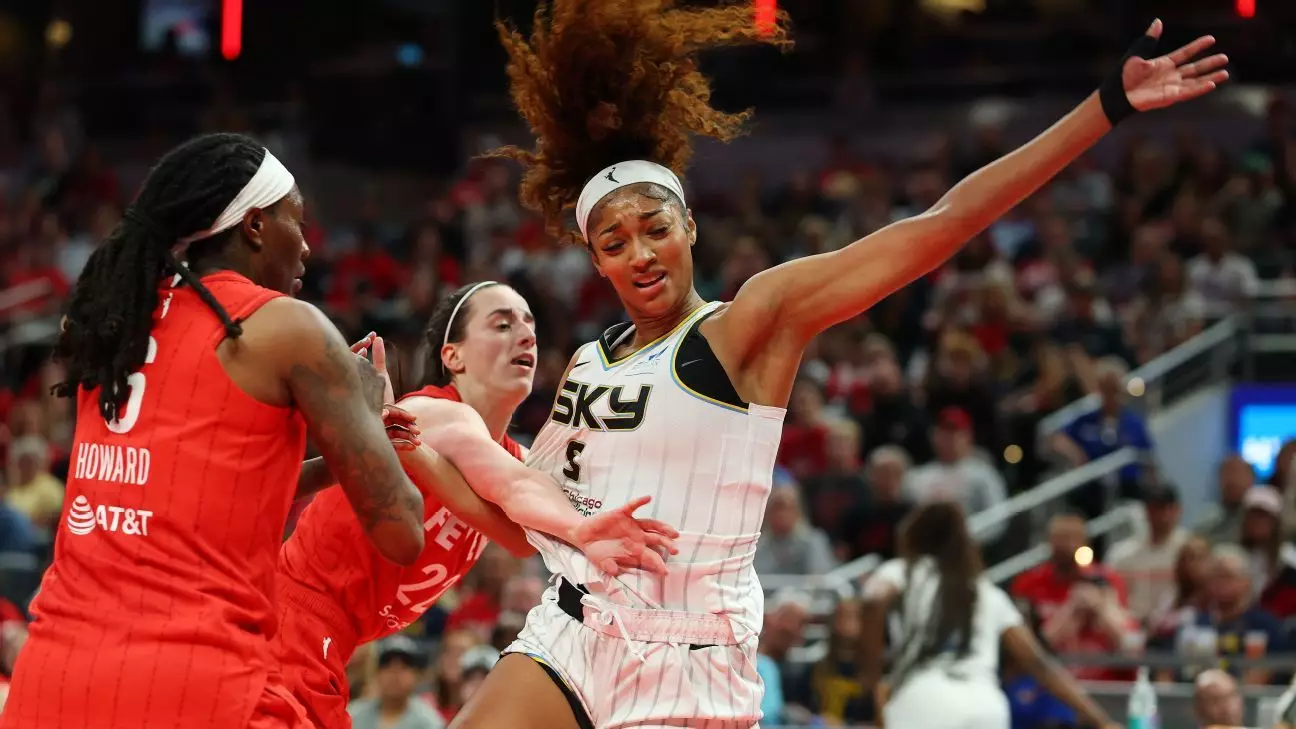The recent basketball clash between the Chicago Sky and Indiana Fever is a disheartening reminder of how a sport that should inspire excitement and unity can also unveil the darkest aspects of fandom. This incident, notably involving players Angel Reese and Caitlin Clark, spiraled into an ugly situation, spotlighting not just poor sportsmanship but also what appears to be a troubling undercurrent of racism and disrespect among fans. The WNBA’s acknowledgment of “hateful fan comments” directed at Reese during the game serves as a crucial indicator that sports are seldom just games; they are battlegrounds for social behaviors, norms, and attitudes.
The confrontation on the court itself, marked by Clark’s aggressive play, suggests competitiveness that can easily tip into hostility. However, what transpired in the stands transcended competitive spirit, delving into a realm of racial animus that has no place in sports—or society. It’s not simply about a foul or gaining a technical advantage; it’s about the implications of race in the context of rivalry, a lens that often distorts our perceptions and expectations.
The WNBA’s Stance: A Call for Action
The WNBA’s response to the allegations reflects a necessary and firm way forward. Following their “No Space for Hate” declaration, league officials have reaffirmed their commitment to creating an inclusive environment. The existence of a program aimed at combating discrimination is a critical step, but the challenge lies in the implementation and sincerity of such policies. “We believe that basketball can be a unifying force,” stated WNBA commissioner Cathy Engelbert, yet it’s crucial to question: can any sport genuinely serve as a sanctuary if the culture surrounding it allows toxicity to thrive?
While we hold the WNBA accountable for fostering an environment devoid of hate, fans must also confront their own biases and behaviors. The booing of Reese not only highlights the ugly face of rivalry but also serves as an indictment of the wider societal norms that condone or overlook essentially prejudiced behavior. What does it say about sportsmanship when the equality of players is overshadowed by the color of their skin? This incident is not simply a blemish on the game; it’s a reflection of how far we still have to go toward true sportsmanship and mutual respect.
Reactions from the Players’ Association
The Women’s National Basketball Players Association (WNBPA) has jumped into action by supporting the league’s investigation and labeling the hateful commentary as “unacceptable.” This unequivocal stance underscores the importance of solidarity among players and the urgent need to advocate for their well-being. Reflecting on the events, the association emphasized that “such behavior is unacceptable in our sport,” urging the league to leave no stone unturned in addressing the issue.
However, while the association’s immediate response is commendable, one must dissect its long-term effectiveness. Athletic organizations often make grand statements in the wake of wrongdoing but lack the systemic changes needed to create an authentic shift in the culture. This is where the focus should shift from mere rhetoric to actionable change, ensuring that each game attended by fans is not just another outing, but a shared commitment to respect and mutual admiration among diverse communities.
The Impasse of Sports Rivalry and Racial Dynamics
Despite the fervor surrounding the incident, both Clark and Reese were quick to downplay their altercation, framing it in terms of standard gameplay. This is troubling. The ease with which they shrugged off an undeniably loaded confrontation could be seen as avoidance of a significant issue that demands examination. It’s a classic example of how the competitive spirit within sports can obscure the realities of race and power dynamics that persist even in moments of supposed unity.
Ultimately, the ongoing investigation will reveal much about the WNBA’s commitment to combating bigotry, but it is the fans and broader public that need to confront their own biases. It is imperative that we take a collective stand against this scourge, not just for the integrity of the game, but for a more just and equitable society in which every athlete feels safe to showcase their talents, unencumbered by hate and division. Sports may blend people together into a singular moment of jubilation, but we must remain vigilant, demanding not merely awareness, but committed action against discriminatory behaviors that aim to fragment our unity. The challenge is not just on the court; it is within us all.

Leave a Reply